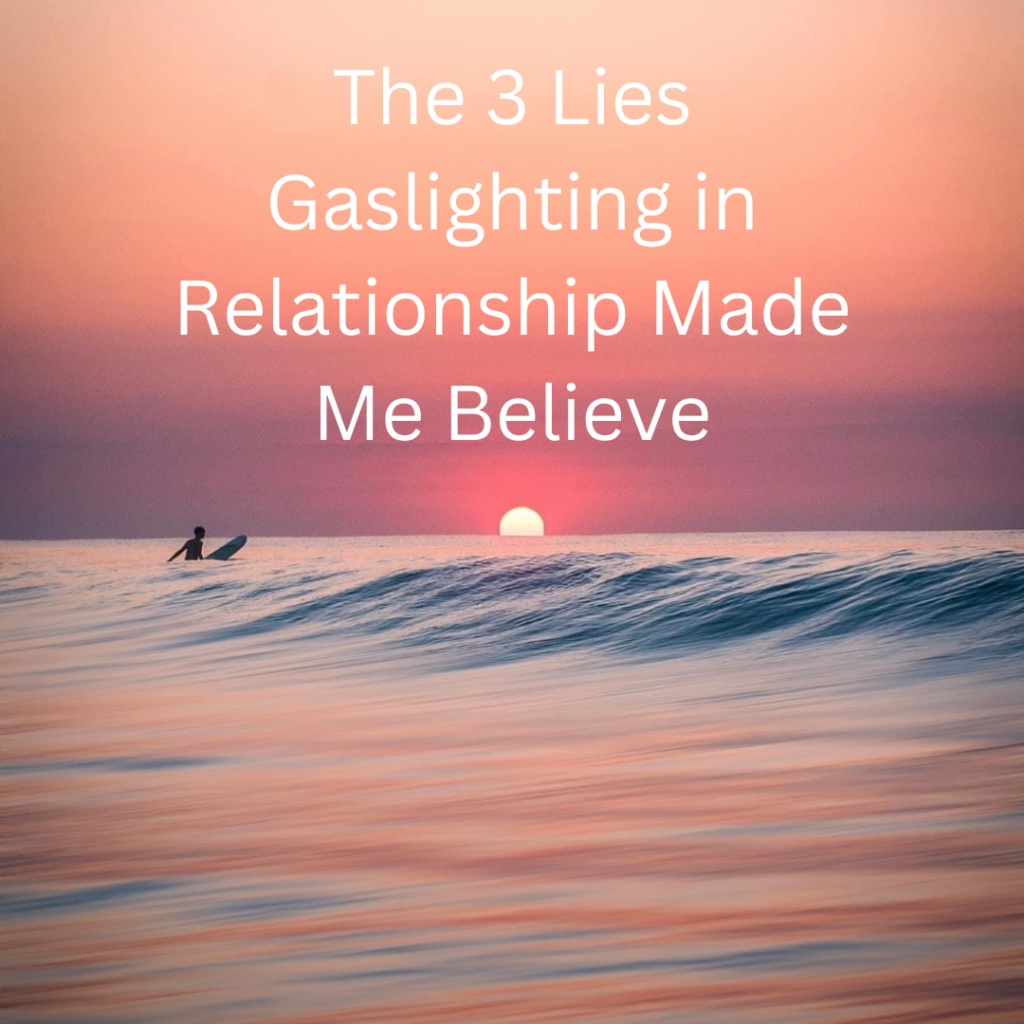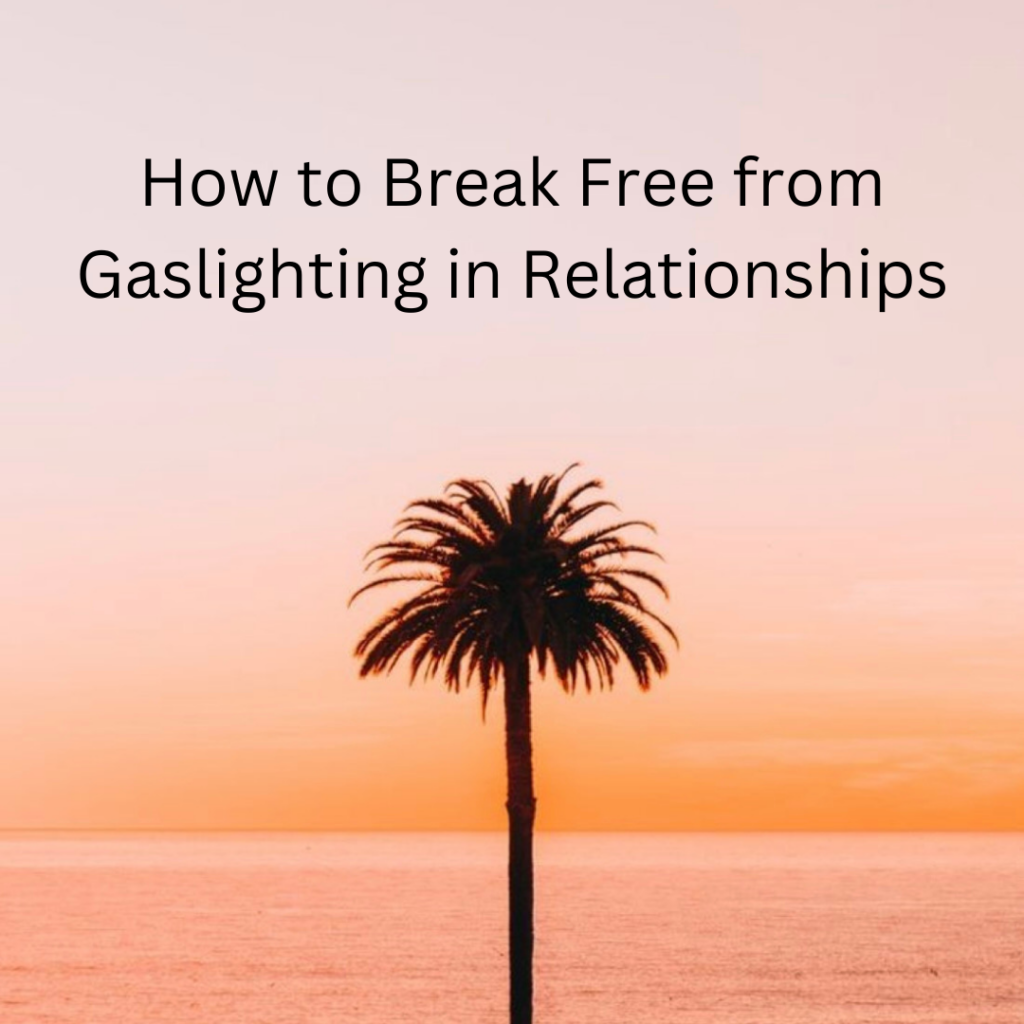Gaslighting in relationships is one of the most damaging forms of emotional abuse, making you question your reality and doubt your own experiences.
“Maybe I’m overreacting. Maybe it’s not that bad. Maybe if I just try harder, things will change.”
I used to tell myself these things all the time. But here’s the truth—I had no idea what was really happening to me. I didn’t recognize it as abuse. I didn’t know the thoughts running through my head weren’t actually mine, they were ideas that had been placed there, reinforced over time, and eventually became my own beliefs.
My ex never sat me down and said, “These are the rules you have to follow.” There were no obvious threats, no demands I could easily push back against. Instead, there were unspoken rules, expectations I didn’t even realize I had started following, limits I unconsciously placed on myself, and behaviors I adjusted to avoid conflict.
I was married to my ex-husband for 15 years before I figured it out. Before I realized I was living in a world where my reality was shaped by manipulation, gaslighting in relationships, and control. And if you’re reading this and thinking, “How did I not see it sooner?”—I want you to know, you are not alone. It’s okay that you didn’t know. The fact that you’re seeing it now is what matters.

The 3 Lies Gaslighting in Relationship Made Me Believe
1. Gaslighting in Relationships Makes You Think, “Maybe I’m Overreacting”
I can’t tell you how many times I heard:
- “You’re too sensitive.”
- “I was just joking. Why do you take everything so seriously?”
- “That never happened. You’re imagining things.”
At first, I fought against it. But over time, I started to wonder if maybe they were right. Maybe I was being too emotional. Maybe my pain wasn’t valid. Maybe I needed to stop making such a big deal out of things.
This is a classic gaslighting in relationships tactic. Gaslighting is a form of psychological manipulation that makes you question your own memories, perception, and even sanity. It keeps you stuck in a loop of self-doubt, making you dependent on the abuser for reality validation. Over time, gaslighting in relationships erodes your confidence in your own perceptions, making you second-guess what’s real and what isn’t.
In The Verbally Abusive Relationship, Patricia Evans describes how verbal abuse isn’t always obvious. It can come in the form of dismissing your concerns, twisting your words, or making you doubt what you know is true. Over time, it wears you down until you don’t even trust your own thoughts anymore.
Truth: I wasn’t overreacting, and neither are you. Your feelings are real. If something hurts, it matters. A healthy relationship allows space for open conversations, not dismissal and gaslighting.
How to Recognize This: If someone consistently makes you question what you saw, heard, or felt, this is a red flag. Keep a journal to document what actually happened versus what they claim. Having written records can help ground you in reality.
How to Respond: When confronted with gaslighting, set firm boundaries. Instead of engaging in debates about your reality, say: “I know what I experienced, and I won’t argue about it.”
2. Gaslighting in Relationships Makes You Believe, “Maybe It Really Is My Fault”
Every argument, every silent treatment, every time he lashed out, it always came back to something I had done.
- “If you hadn’t made me mad, I wouldn’t have reacted that way.”
- “You make everything so difficult.”
- “I wouldn’t have to ignore you if you didn’t always start fights.”
And so, I tried harder. I walked on eggshells. I made myself small, anything to avoid upsetting him.
This is known as blame-shifting, where the abuser refuses to take accountability and instead places responsibility for their actions on you. This tactic works because it instills guilt, if you believe their behavior is your fault, you’re more likely to stay and try to “fix” things.
In Why Does He Do That? Lundy Bancroft explains that abusers don’t act out of loss of control—they act with calculated intent. Their goal is to shift blame so they never have to take responsibility. When an abuser makes you feel like everything is your fault, it’s not because they believe it—it’s because they want you to believe it.
Truth: His behavior was NOT my fault, and it’s not yours either. A healthy relationship does not require you to shrink yourself just to keep the peace.
How to Recognize This: If you feel like you’re constantly apologizing but never being apologized to, this is a major red flag. Healthy relationships involve mutual responsibility, not one-sided guilt.
How to Respond: Practice self-validation. When they try to shift blame onto you, remind yourself: “I am not responsible for their choices. I control my actions, not theirs.”
3. Gaslighting in Relationships Makes You Believe, “Maybe If I Try Harder, They’ll Change”
I believed in the potential. I believed in the good moments. I told myself:
- “Maybe if I communicate better, they’ll finally understand.”
- “If I just give them more time, they’ll change.”
- “They weren’t always like this—maybe things can go back to how they used to be.”
This is one of the hardest lies to break free from because it’s often rooted in hope and cognitive dissonance. Cognitive dissonance happens when we hold two conflicting beliefs, like “they hurt me” and “they love me.” Our brain tries to resolve this conflict, often by justifying or downplaying the negative behavior to make it align with the positive moments we cling to.
Truth: I couldn’t make him change, and neither can you. No amount of love, patience, or sacrifice will turn them into the partner you deserve.
How to Recognize This: If you find yourself making excuses for their behavior (“They had a rough childhood” or “They’re just stressed”), take a step back. Does their “stress” justify mistreatment?
How to Respond: Shift your focus from “fixing” them to protecting yourself. Instead of asking, “How can I get them to change?” ask, “What do I need to be safe and healthy?”

How to Break Free from Gaslighting in Relationships
Recognizing gaslighting in relationships is the first step toward breaking free. Healing from this form of manipulation takes time, but it’s possible. The more you reclaim your reality, the stronger you become.
I stopped waiting for permission to leave. My pain was valid, and I didn’t need anyone to tell me that it was “bad enough” to walk away – this was a hard one for me!
I set boundaries. I no longer let someone else define my worth. Love should never require you to abandon yourself.
I found people who truly understood. Healing didn’t happen overnight, and I didn’t do it alone. Finding people who understood what I had been through changed everything.
Healing isn’t just about walking away—it’s about unlearning the lies they made you believe and reclaiming your self-worth.
Final Thoughts: You Deserve More
If no one has told you this yet—I will: It wasn’t your fault. You didn’t deserve it. And you are not broken.
I know how hard it is to let go of the guilt, the what-ifs, and the hope that things could have been different. But you don’t have to stay trapped in that place. You have the right to heal. You have the right to rebuild a life where you don’t have to prove your worth to anyone.
You are allowed to leave. You are allowed to move forward. You are allowed to be free.
Have you ever told yourself these lies? Let’s talk about it in the comments. Or, if you need support breaking free, DM me or book a coaching session—I’m here to help.
Recommended Reading
If this post resonated with you, here are some books that can help you understand toxic relationships and begin healing:
Why Does He Do That? by Lundy Bancroft – A deep dive into the mindset of abusive partners and how they manipulate.
The Verbally Abusive Relationship by Patricia Evans – A guide to recognizing and escaping verbal and emotional abuse.
Psychopath Free by Jackson MacKenzie – How manipulators operate, and how to reclaim your identity after abuse.
Dodging Energy Vampires by Dr. Christiane Northrup – How to protect yourself from emotionally draining people.
These books helped me see the truth of what I had experienced, and they can help you, too.






[…] so long, I got used to being talked over, dismissed, or told I was too sensitive. I’d start to share something that mattered to me, and halfway through, I’d realize I was […]
feel this so deeply. When you’re talked over or dismissed enough times, it can start to feel like your voice doesn’t matter—or like maybe you’re too much just for having feelings. But you’re not. Wanting to be heard, valued, and respected isn’t being too sensitive—it’s being human.
What you shared is exactly why I wrote this post. Everyone deserves relationships where they feel safe to speak, to feel, and to just be themselves without walking on eggshells. You’re not alone, and you’re not asking for too much.
Thank you for being brave enough to write this. If you ever want to connect more, I’m here.